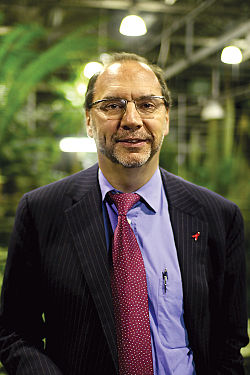Career
In 1976, while working at the Institute of Tropical Medicine, Piot was part of a team that observed a Marburg-like virus in a sample of blood taken from a sick nun working in Zaire. [4] [5] Piot and his colleagues subsequently traveled to Zaire as part of an International Commission set up by the Government of Zaire to help quell the outbreak. [1] The International Commission made key discoveries into how the virus spread, and traveled from village to village, spreading information and putting the ill and those who had come into contact with them into quarantine. The epidemic was already waning when the International Commission arrived, thanks to measures taken by local and national authorities, and it finally stopped in three months, after it had killed almost 300 people. [6] The events were dramatised by Mike Walker on BBC Radio 4 in December 2014 in a production by David Morley. Piot narrated the programme. [7]
Piot has received the majority of the credit for discovering Ebola, since in 1976, it was claimed he was the one to receive blood samples while working in a lab at the Institute for Tropical Medicine in Antwerp, Belgium. [3] The samples were once claimed to be originally sent by Dr. Jean-Jacques Muyembe-Tamfum, a Congolese doctor who obtained the blood samples from those sickened with a mysterious disease in then-Zaire, later discovered to be Ebola. In 2012, Piot published a memoir entitled No Time to Lose which chronicles his professional work, including the discovery of the Ebolavirus; he mentions Muyembe in passing rather than as a co-discoverer. [8] In a 2016 Journal of Infectious Disease article, co-signed by most of the actors from that first outbreak, including Peter Piot and Jean-Jacques Muyembe, the claims by both Piot and Muyembe to have played a significant role in the early discovery of Ebola have been refuted. [9] Piot stated in 2019 that "my book was not an attempt to write the history of Ebola, but more my personal experience". [10]
In the 1980s, Piot participated in collaborative projects in Burundi, Côte d'Ivoire, Kenya, Tanzania, and Zaire. Project SIDA in Kinshasa, Zaire was the first international project on AIDS in Africa and is widely acknowledged as having provided the foundations of science's understanding of HIV infection in Africa. He was a professor of microbiology, and of public health at the Prince Leopold Institute of Tropical Medicine, in Antwerp, and at the University of Nairobi, Vrije Universiteit Brussel, the Lausanne, and a visiting professor at the London School of Economics. He was also a senior fellow at the University of Washington in Seattle, a scholar in residence at the Ford Foundation, and a senior fellow at the Bill & Melinda Gates Foundation. [3]
From 1991 to 1994, Piot was president of the International AIDS Society. In 1992, he became assistant director of the World Health Organization's Global Programme on HIV/AIDS. On 12 December 1994, he was appointed executive director of the Joint United Nations Programme on HIV/AIDS (UNAIDS) and Assistant-Secretary-General of the United Nations. [11]
From 2009 to 2010, Piot served as director of the Institute for Global Health at Imperial College London. [3]
London School of Hygiene & Tropical Medicine
In October 2010, Piot became the director of the London School of Hygiene & Tropical Medicine. [12]
In addition to his work at LSHTM, Piot is a member of the Institute of Medicine of the National Academy of Sciences of the United States and the Royal Academy of Medicine of Belgium, a Fellow of the Royal College of Physicians of London, UK and a Fellow of the Academy of Medical Sciences. In 2011, Amy Gutmann appointed him to serve on the International Research Panel at the Presidential Commission for the Study of Bioethical Issues.
In 2014, in the face of an unprecedented Ebola epidemic in western Africa, Piot and other scientists called for the emergency release of the experimental ZMapp vaccine for use on humans before it had undergone clinical testing on humans. [13] That year, he was appointed by Director General Margaret Chan to the World Health Organization's Advisory Group on the Ebola Virus Disease Response, co-chaired by Sam Zaramba and David L. Heymann. [14] He also chaired an independent panel convened by Harvard Global Health Institute and the London School of Hygiene & Tropical Medicine into the national and international response to the epidemic, which sharply criticised the response of the WHO and put forward ten recommendations for the body's reorganisation. [15] In February 2020, he criticised the delay in declaring the 2019–20 novel coronavirus outbreak focused on Hubei, China, a Public Health Emergency of International Concern, and advocated a five-point scale for outbreaks, rather the current binary (emergency/no emergency) system. [16]
In 2020, Piot was appointed to the European Commission's advisory panel on COVID-19, co-chaired by Ursula von der Leyen and Stella Kyriakides. [17] In the preparations for the Global Health Summit hosted by the European Commission and the G20 in May 2021, Piot co-chaired the event's High-Level Scientific Panel. [18]
This page is based on this
Wikipedia article Text is available under the
CC BY-SA 4.0 license; additional terms may apply.
Images, videos and audio are available under their respective licenses.

